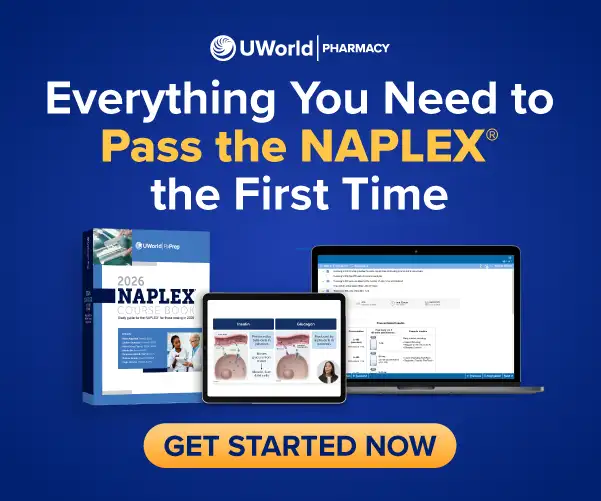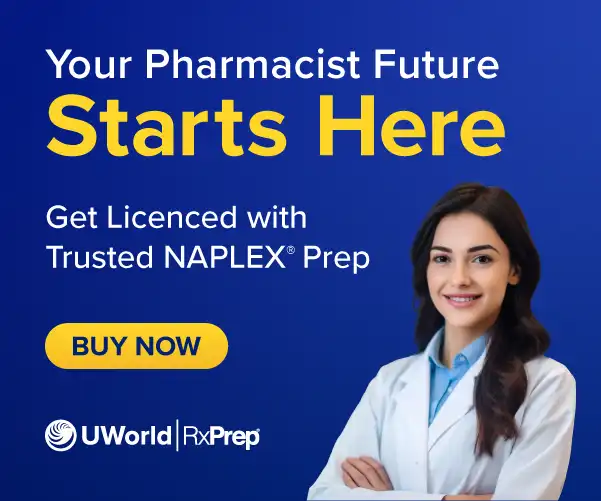Residency interviews play a critical role in the match process for good reason. They give programs a chance to evaluate how you think through clinical problems, communicate under pressure, and align with the values of their team. They also give you a chance to showcase your strengths beyond what’s written on your CV or letter of intent.
There’s a pattern to the questions residency programs ask, so you don’t need to waste your brain space trying to guess what’s coming. Here are the most common clinical, behavioral, and program-fit interview questions so you can start practicing with intention.
Frequently Asked Pharmacy Residency Interview Questions
For each residency interview, expect a structured format with traditional, behavioral, and clinical questions, often revolving around your motivation, goals, and program fit. The best way to show up prepared is to understand what to expect. By practicing responses to each question type early on, you can avoid generic answers and offer thoughtful insights that accurately reflect your personality, clinical experience, and professional goals.
Below are some of the most common pharmacy residency interview questions, organized by category. These represent the prompts you’ll most likely encounter, especially during your first phase interviews between January and March.
These questions help interviewers understand what drives you. They want to see that you’re passionate about pharmacy, committed to growth, and genuinely interested in the demands of residency training.
Common Interview Questions
- Why did you choose pharmacy as a profession?
- What motivated you to pursue a residency instead of entering the workforce?
- What excites you most about a pharmacy residency?
- What do you hope to gain from a residency experience?
- What aspects of pharmacy practice are you most passionate about?
With motivation-based questions, interviewers are looking for a clear sense of purpose, enthusiasm for learning, and alignment with the values of the profession and the residency program. You can communicate this by speaking sincerely about what fuels your interest in patient care and describing specific moments, whether in rotations or leadership, that helped shape your commitment to pursuing advanced training.
Directors use career-oriented questions to gauge whether your short- and long-term plans align with the program's offerings. Directors want to know that you’ve thought through your future and see their residency as a meaningful next step. Programs are also invested in the success of their alumni. Graduates who go on to do great things reflect positively on the program and help strengthen its reputation.
Common Interview Questions
- Where do you see yourself in 5 or 10 years?
- What are your short-term and long-term career goals?
- How will this residency help you achieve your career objectives?
- Are you interested in pursuing a residency program or board certification?
- What area of pharmacy practice do you want to specialize in?
When it comes to career goals, programs look for realistic, well-thought-out plans that show you've considered how this residency fits into your broader trajectory. Focus on showing self-awareness and direction. Even if your exact path isn’t set in stone, you can highlight how the program’s strengths align with what you hope to learn and contribute.
These questions help programs assess whether you’ve done your homework on what their residency offers, as well as whether you’re likely to thrive in their environment. Fit isn’t just about credentials from your CV but about culture, values, and mutual alignment.
Common Interview Questions
- Why did you choose to apply to our residency program?
- What aspects of our program appeal to you most?
- How do you see yourself contributing to our program?
- What makes you a good fit for our team?
- What are you looking for in a residency program?
When questions about program fit come up, interviewers want to hear that you’ve researched the program thoroughly, understand what sets it apart, and can articulate why you’d be a strong match for their team and training environment.
Try to highlight specific program features such as unique rotations, mentorship structure, or patient populations that genuinely appeal to you. Then, connect those to your communication, teamwork, or adaptability strengths to show how you’ll contribute meaningfully in those settings.
Behavioral Interview Questions for Pharmacy Residency
In addition to the general questions about your goals and interests, most residency interviews include behavioral questions— a specific category designed to explore how you respond in real-world situations. These questions are especially common in residency interviews and give programs insight into your communication skills, decision-making process, ethical judgment, and ability to work on a team.
Expect to be asked about how you navigated a challenge, resolved a conflict, or contributed to patient care. You might hear questions such as:
- Tell me about a time you impacted a patient’s healthcare.
- Describe a situation where you had to resolve a conflict within a team.
- Give an example of a time you had to make a difficult decision.
- Tell me about a time you had to manage multiple priorities under a tight deadline. How did you stay organized?
- Describe a time when you received critical feedback. How did you respond, and what did you take away from the experience?
- Give an example of a situation where you had to advocate for a patient.
- Tell me about a time you made a mistake in a clinical setting. How did you handle it?
- Describe a situation where you had to collaborate with someone who had a different communication style from yours.
- Share a time when you had to make a decision without having all the information you wanted. What did you do?
- Give an example of how you handled a disagreement with a preceptor, colleague, or team member.
Programs ask these questions to see how you manage responsibility, think on your feet, and reflect on your experiences. To answer effectively, structure your response using the STAR method:
- Situation: Briefly explain the context.
- Task: Clarify your role or objective.
- Action: Describe what you did and why.
- Result: Share the outcome and what you learned.
Behavioral questions are often your best opportunity to highlight the soft skills your CV won't reveal on its own. When practicing, choose prompts that will allow you to show qualities like empathy, accountability, collaboration, and resilience. These are the attributes programs listen for closely.
Clinical Questions in Pharmacy Residency Interviews
Alongside general and behavioral prompts, residency programs often include a separate category of clinical questions designed to assess how you apply your pharmacotherapy knowledge. These questions test your ability to make evidence-based decisions and explain your clinical reasoning.
You might be asked to walk through a specific case or explain how you would manage a particular condition. Examples include:
- How would you manage a patient with new-onset atrial fibrillation?
- What steps would you take if a patient is not responding to standard therapy?
- Describe how you would counsel a patient starting on warfarin.
- How would you manage a patient experiencing bleeding while on anticoagulation therapy?
- What would you recommend for a patient newly diagnosed with diabetes who is hesitant to start insulin?
- How do you approach antimicrobial stewardship when reviewing a patient’s antibiotic regimen?
- What steps would you take for a patient with uncontrolled hypertension despite being on 2 medications?
- How would you counsel a patient starting a new medication with significant side effects?
- What factors would you consider before recommending a change from IV to oral therapy in an inpatient setting?
- How would you handle a situation where your recommendation was not accepted by the healthcare team?
Interviewers ask these questions to evaluate what you know and how you think through a problem. They want to see that you can prioritize safety, appropriately reference clinical guidelines, and adapt your approach based on patient-specific factors.
To prepare, review high-yield clinical topics, common disease states, and current guidelines. Just as importantly, practice talking through your thought process out loud. With these questions, clarity and reasoning are often more valuable than rushing to the “right” answer.
If you don’t know something, it’s OK to say so — just be honest and walk through how you would approach finding a solution and helping the patient. It’s far better to show thoughtful decision-making than to guess or try to sound right.
Questions to Ask Directors and Faculty During Interviews
Residency interviews aren’t just about answering questions — they’re also your chance to ask them. Think of each interview as a 2-way street: You’re also interviewing the program representative to see if it’s a team you genuinely want to be part of and a place that will support your long-term career growth.
Interviewers often leave time at the end of your conversation for questions, so come prepared with a few in mind that will help you gather meaningful insight and determine if the program is the right fit. Here are examples of questions to ask based on who you're speaking with:
Questions for Residency Program Directors
- What is the structure of the residency program?
- How are rotations scheduled, and what are the expectations for each?
- What mentorship opportunities are available to residents?
- How is feedback provided and how often?
- What support is offered for research, quality improvement, or teaching projects?
- What do you see as the program’s strengths and areas for growth?
Questions for Current Residents or Faculty
- What does a typical day look like for a resident here?
- How is work-life balance supported?
- What challenges do residents face most often?
- How would you describe the program’s culture and team dynamic?
- What opportunities exist for leadership or professional development?
- How does the program respond to resident feedback or suggestions?
Asking these questions helps demonstrate your curiosity, professionalism, and commitment to finding the right training environment. It also allows you to walk away with the insight you’ll need to make an informed ranking decision after interviews are complete.
Whenever possible, tailor your questions based on the program’s structure and your specific interests. For example, if you’re passionate about ambulatory care, ask about rotations in that setting. If teaching excites you, ask about precepting opportunities or teaching certificates. This not only shows you’ve done your homework, but it also helps you visualize your place in the program.
Step-by-Step Guide for Residency Interview Prep
Preparing for your pharmacy residency interview involves understanding the interview format, researching each program, and practicing how you'll present your clinical knowledge and professional experience in a high-stakes setting. You’ll need to be ready to talk through pharmacotherapy decisions in one moment, and your leadership experience in the next.
Practicing your delivery and content will help you walk in feeling prepared and not scripted. Here’s a structured approach to help you cover everything from program research to interview logistics:
- Research Each Program Thoroughly
Review the program’s website, ASHP listings, and any recent updates or publications. Make note of their core values, unique rotations, and focus areas. This will help you tailor your answers and show genuine interest in the program. - Review Your Application Materials
Revisit your CV, letter of intent, and personal statement. Be ready to speak confidently about any rotations, projects, or experiences you’ve listed — and make sure your answers align with the story you’ve already shared on paper. - Refresh Key Clinical Knowledge
Brush up on high-yield topics related to the program’s focus (e.g., critical care, ambulatory care). Review current guidelines and be prepared to talk through common disease states or case-based scenarios. - Practice Common and Behavioral Questions Using the STAR Method
Structure your responses to behavioral prompts using the STAR method. Practicing out loud helps you refine your delivery and avoid rambling. - Schedule Mock Interviews
Ask a preceptor, faculty mentor, or peer to run through a practice interview with you. Record your responses if possible so you can assess your tone, pacing, and body language. Request honest feedback. - Prepare Questions to Ask During the Interview
Come in with 4-5 thoughtful questions tailored to the program. Ask about mentorship, rotations, resident wellness, and teaching opportunities. - Plan Your Interview Logistics
Whether your interview is virtual or in-person, plan ahead. Choose a quiet, distraction-free space, test your technology, and set up your background if virtual. For in-person interviews, plan your route and professional attire the day before. - Reflect on Your Experiences and Practice Speaking with
Confidence
Interviewers want to get to know you, not your resume. Practice connecting your experiences to your values and goals, and be ready to explain how they’ve shaped the kind of resident you hope to become. - Refine Your Delivery for Stronger Answers
Practice your delivery to ensure your answers are strong. Keep your answers focused, avoid filler, and tailor your responses to each program. Practicing your delivery out loud will help you sound polished but not rehearsed.
How to Succeed in Your Pharmacy Residency Interview
Strong answers matter, but how you carry yourself throughout the interview often sets you apart. Program directors evaluate more than your clinical knowledge — they assess how you think, communicate, and engage with others in a professional setting.
Top Strategies for a Strong Residency Interview
Go into your interview with these high-impact strategies to help you make the most of your interview experience.
|
Practice Mock Interviews The more you rehearse, the more natural your responses will feel. Practice with peers, mentors, or career services staff who can simulate the interview environment and give you honest feedback on your delivery. |
Communicate Professionally Speak purposefully, avoid filler words, and make eye contact, especially during virtual interviews. Active listening is just as important as what you say. Take a breath, listen carefully to the question, and respond with intention. |
Express Enthusiasm Let your passion come through, especially when discussing why you chose pharmacy or are drawn to a specific program. Directors want to see that you’re qualified and truly excited to grow in their environment. |
|
Highlight Your Soft Skills Your CV already covers your credentials. This is your chance to show the qualities that don’t fit in a bullet point. Teamwork, leadership, adaptability, and emotional intelligence are key attributes programs look for. |
Be Yourself, But Be Prepared Authenticity builds trust, but preparation shows professionalism. Aim to strike that balance. Your goal is to help the interviewer see what you know and who you are as a future colleague. |
Follow Up Afterward Send a thank-you email within 24 hours. It is a simple but meaningful way to reinforce your interest in the program. Reference a specific part of the conversation to make your message feel personal and genuine. |
Mistakes to Avoid During the Interview
Even with solid preparation, interviews can bring unexpected challenges. Knowing some common pitfalls ahead of time can help you stay composed and make a strong impression. Here are a few key mistakes to avoid:
|
Giving Vague or Generic Answers Avoid responses that could apply to anyone. Instead, use specific examples that show your unique experiences and thought process. |
Not Answering the Question Asked Listen carefully and make sure you fully understand the question before diving in. If you’re unsure, it’s OK to ask for clarification or take a moment to gather your thoughts. |
Speaking Negatively About Past Experiences Even if a rotation or work environment was challenging, frame it professionally. Focus on what you learned or how you grew rather than what went wrong. |
|
Overlooking Nonverbal Communication Your posture, eye contact, and tone all affect how your responses are received. Aim to stay engaged and speak with confidence, even during virtual interviews. |
Letting Nerves It’s normal to feel pressure, but don’t let it derail your focus. If you get stuck, take a breath, refocus, and talk through your reasoning calmly. Programs care more about how you think than having a perfect answer. |
Skipping the Following up with a brief, sincere thank-you email shows professionalism and respect. It’s a small step that can reinforce a positive impression. |
Every step that’s led you here — your coursework, rotations, and long nights studying — has prepared you for this moment. Stay grounded, speak from experience, and let your passion lead the way. You’re more prepared than you think you are.









